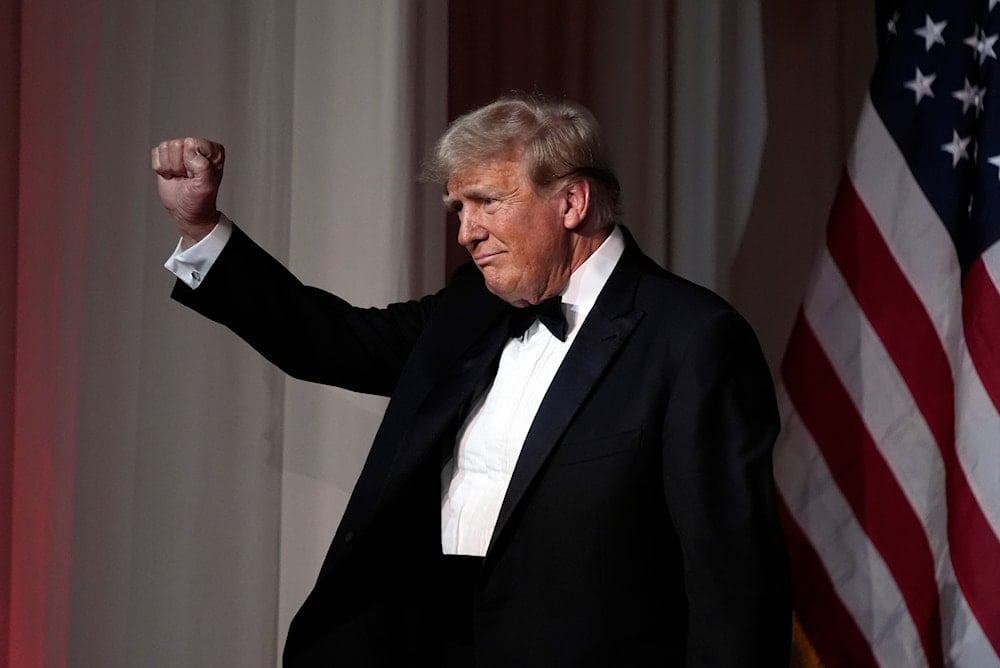Trump shouldn't overestimate US influence: Responsible Statecraft
A report by Responsible Statecraft indicates that US global influence is waning, and it is Trump's responsibility to steer a new approach to address this decline.
-

President-elect Donald Trump gestures after speaking during an America First Policy Institute gala at his Mar-a-Lago estate, on November 14, 2024, in Palm Beach, Florida. (AP)
A report by Responsible Statecraft on Monday suggested that the United States has long faced the danger of overvaluing its global sway by relying on outdated assumptions shaped by historical events.
'A multipolar world is now steadily emerging.'
The report suggests that power and influence, while interconnected, are distinct concepts, both of which are fluid and relative within the ever-changing global landscape.
As of 2024, the US holds the world’s largest GDP, with China right behind in second place. Militarily, the US remains unparalleled, accounting for 40.5% of global defense spending—exceeding the combined expenditures of the next ten countries. In comparison, China contributes 10% of the global total, and Russia 4.8%.
However, the report suggests that this substantial power does not automatically equate to influence. The rising challenges to US authority and the rejection of its global preferences illustrate the limits of translating raw power into meaningful sway.
US influence going downhill
The BRICS-plus summit in Kazan, hosted by Russian President Putin, highlights the changing global order. Contrary to Washington's view of Russia as isolated, 36 nations gathered to discuss key issues like the Ukraine war, Middle East tensions, and reducing dependence on the US dollar.
While BRICS doesn't offer a unified alternative to Western institutions, its growing membership reflects a shared goal to create a more equitable global order, challenging the post-WWII framework. Additional signs of waning US influence are evident both in its own "backyard" and in regions far removed across the globe.
According to the report, Venezuelan President Nicolas Maduro has openly defied Washington's warnings about unfair elections, while Israeli Prime Minister Benjamin Netanyahu ignores Biden's calls to uphold international law in Gaza, the West Bank, and Lebanon.
Countries considered US partners, such as India, continue substantial trade with Russia and Iran despite Western sanctions. Likewise, Indonesia, despite US efforts, held its first joint military exercises with Russia this month, and Arab states resisted US pressure to condemn the Yemeni Armed Forces, according to the Responsible Statecraft.
In an ironic turn, Washington has called on China to use its influence over Russia and the Democratic People's Republic of Korea (DPRK) to help de-escalate the war in Ukraine while simultaneously criticizing China's military expansion in the South China Sea, sending US warships to the region, and imposing sanctions and trade restrictions on Beijing.
A major driving force behind the challenge to US dominance is Washington’s tarnished reputation, combined with the systemic inequalities imposed on the non-Western world by the current global order. These factors fuel the demand for new international rules and norms, according to the report.
Struggling with the new reality
Official Washington is struggling to adapt to the shifting global landscape. Often dismissing the importance of BRICS and other emerging challenges, US leaders, regardless of political affiliation, continue to view the US as essential and dominant.
The diverse BRICS bloc reflects a non-binary world, with countries like Russia, China, and Iran at odds with the US, while India, Brazil, and Indonesia seek balanced ties with all major powers. These nations prioritize their interests by avoiding alignment in major conflicts, similar to the Non-Aligned Movement (NAM), founded in 1961 and still active with around 120 members.
As major powers see their influence decline, history shows this process is rarely smooth and often leads to conflicts. To minimize such risks, the report suggests that Washington must shift from its binary view of international relations and recognize that many countries now prefer to diversify their security, economic, and political ties.
Trouble in Trump's Paradise
The report suggested that the newly elected Trump administration is more likely going to try to sustain the illusion of US power while inadvertently accelerating its decline.
As per the report, Pew surveys on global trust in US leaders show a sharp decline in confidence during Trump’s final term, with approval ratings falling to a record low of 23-31%, compared to 74% trust in Obama’s first term.
While trust in Biden has slightly improved to a median of 43%, the overall trend over the past eight years highlights a broader decline in US influence globally.

 4 Min Read
4 Min Read








